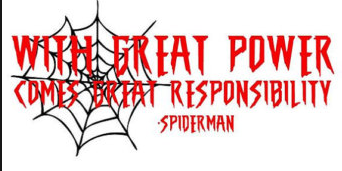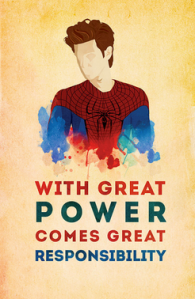I waited to write this post until after Ed Freeman’s lecture because I had a feeling something would inspire me that was also related to the play. I wasn’t disappointed!
Freeman said that Nike is being pressured to change the working conditions in flower fields. Why? It sounds odd, doesn’t it? Well, Nike uses dyes made from flowers to color their products. These flower fields allegedly utilize child laborers.
This phenomenon troubles me since there are many stakeholders involved in every supply chain. In this example, the supply chain begins with the owners of the flower fields and ends with the consumer that purchases the Nike product (or even further to wherever the products are discarded.) This reminded me of the portion in the Bucknell revised play that stops to feature Jobs’ interview about the Foxconn working conditions. The interviewers were harsh, questioning Apple’s practices. Jobs defended the company saying, “We’re all over this” yet the interviewer persists. Shouldn’t all the stakeholders in a supply chain be responsible for solving the problems that their processes create? Why does it seem to be the responsibility of the most visible entity?
Is this scapegoating? It’s reminiscent of Nike’s persecution over child labor in the early 90’s and Lance Armstrong’s fall from fame after doping accusations. In each of these cases, their peers were acting in the same exact manor: the majority of clothing companies, the majority of professional cyclists, and now the majority of technology companies are guilty of the same behaviors. However, the public and media come down the hardest on the largest entity. Is that fair? Does Spiderman’s “With Great Power” tagline come into effect?
I think the issue is two-fold. Firstly, all peer organizations (i.e. all technology companies) should be held to the same standards. Secondly, all other stakeholders impacted by a particular supply chain are responsible for the results of their processes (i.e. Foxconn, Apple users, U.S. Government, Chinese Government, Apple, Suppliers, Distributors.) It is not something that one piece of the supply chain can solve singlehandedly.
Clearly, these are many questions that I’m still personally grappling myself!



You raise some great points here. The one question that resonated with me was when you asked, “why does it seem to be the responsibility of the most visible entity”? I think that Ed Freeman also referenced this in his speech tonight. He seemed to directly answer his own question when he said, “Iconic brands get it the worst”. I think we can all agree that Apple is definitely an iconic brand and consequently, getting criticized very harshly and very often. However, I liked how Ed did not have pity for Apple regarding this topic. Instead, he interpreted the spotlight that iconic brands are constantly under as a good thing since it will only prevent them from unethical actions. My question then becomes, is Apple taking the attention of being in the spotlight seriously? Do they know that they are iconic?
LikeLiked by 1 person
Just because Apple is the most iconic entity in the supply chain does not make them the best equipped or most responsible for solving the problem. Foxconn and the Chinese government are in a much better place to enact change within the factories than Apple ever will be. While Freeman’s desire to change business models is great. It’s not realistic -at least not now. This is an issue to be solved through law and regulations.
LikeLike
Emily, while I agree with you that Apple is not the best equipped or most responsible for solving the problem of unfair working conditions, Apple does have the power to choose suppliers that treat their workers fairly. Yes, the actual unfair working conditions need to be solved through law and regulations, but Apple had and continues to have an opportunity to only work with suppliers that provide safe working conditions and fair pay for its workers.
LikeLike
This is an interesting conversation that has begun here: who is the best entity to take a stand against the atrocious working conditions in Shenzhen? I would agree with Carolina–Apple has the power. I do believe that a few larger factors are at play–like the influence of the Chinese government, other technology firms and Foxconn itself–but Apple is ultimately capable of choosing their suppliers. Apple has the potential to be lauded in the industry and society in general for finally taking responsibility for its actions. This move has the potential to create value for all of Apple’s stakeholders.
LikeLike
I agree with Spencer and Carolina. It is up to Apple to hold their suppliers to the standards that they claim to abide by. Every step of the production process needs to be under scrutiny otherwise aren’t they being hypocritical? You shouldn’t sell a product that isn’t manufactured ethically and it’s up to the consumers to recognize the brands that do the right thing. When it is the normal practice of consumers to find the brands that we agree with it will force the Apple’s of the world to find ethical manufacturers. The rest of the electronics manufacturers will either already be doing this or, like Apple, will have to change up their suppliers. Those that don’t will cease to exist.
LikeLike
While I agree that all steps in the supply chain should be involved in improving total value and ensuring ethical business practices, it is the choice of consumers as to whether or not this is a determining factor in their decision to purchase a product or service. Although Apple has taken lots of criticism lately, it will not “cease to exist,” nor cease to prosper if it chooses to maintain its current business model. Unfortunately, not everyone is aware of these issues and not everyone feels passionately enough about them to do something about it.
LikeLike
So it is more in the hands of consumers then Apple (or any manufacturer) to insure that products are ethically made?
LikeLike
I am always interested in that Spiderman quotation. It is so simple and inelegant, and yet we all remember it. Why? is it paraphrasing something more famous? Does it have a poetic ring?
Just one of those niggling things that keeps me up at night.
LikeLike
If you say Nike was “persecuted” in the 1990s, Are you saying it was unfair or groundless?
LikeLike
So, in the end, you are arguing that the whole supply chain needs to be seen as more responsible, collectively, then simply the largest or most brand-visible link in the supply chain?
LikeLike